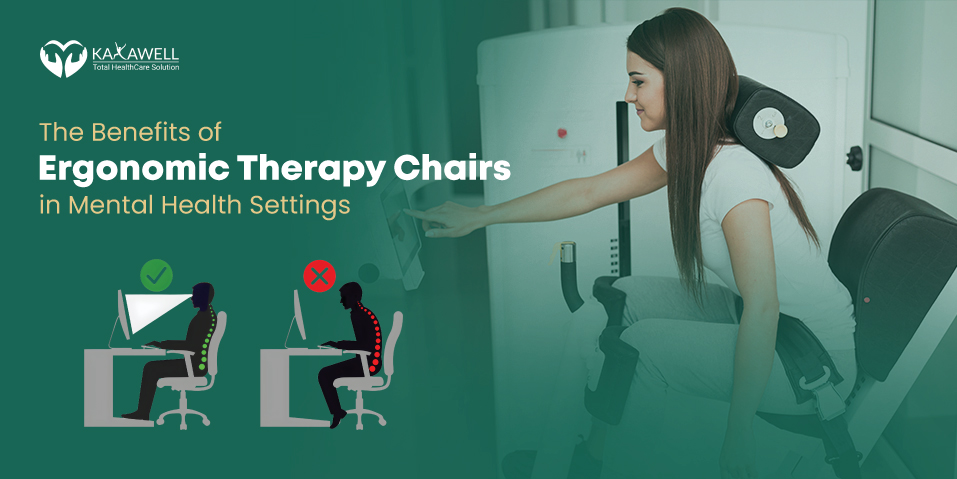In recent years, there has been increasing recognition of the physical environment’s role in mental health care. One significant advancement in this realm is the integration of ergonomic therapy chairs into mental health settings. These specialized chairs are more than just a luxury; they can play a pivotal role in enhancing the therapeutic experience. Here’s how ergonomic therapy chairs are making a difference in mental health settings:
1. Enhancing Comfort and Reducing Discomfort
One of the primary benefits of ergonomic therapy chairs is their ability to offer superior comfort. Traditional chairs can often cause discomfort or even pain, which can detract from the therapeutic process. Ergonomic chairs have adjustable features, lumbar support, and cushioning that conform to the body’s natural curves. This comfort helps clients focus on therapy rather than being distracted by physical discomfort, fostering a more effective therapeutic environment.
2. Promoting Relaxation
Comfortable seating plays a crucial role in creating a relaxed atmosphere. Ergonomic chairs are designed to support the body in a way that reduces stress on muscles and joints. By minimizing physical strain, these chairs help clients feel more at ease, which can lower anxiety levels and facilitate a more open and productive dialogue during therapy sessions. This enhanced relaxation can also aid in the client’s ability to engage deeply with therapeutic techniques and exercises.
3. Supporting Healthy Posture
Good posture is essential for both mental and physical well being. Ergonomic therapy chairs are designed to encourage proper posture, which can have a positive impact on a client’s overall sense of well-being. Proper posture not only prevents physical discomfort but also promotes a feeling of stability and confidence. In therapy settings, where clients might be discussing sensitive or challenging topics, a chair that supports healthy posture can help clients maintain focus and engagement.
4. Reducing Physical Stress
Extended periods of sitting, particularly in poorly designed chairs, can lead to physical stress and strain. Ergonomic therapy chairs are crafted to alleviate these issues by providing adequate support and promoting movement. This reduction in physical stress can be particularly beneficial for clients who experience chronic pain or have conditions that affect their musculoskeletal system. By addressing these physical concerns, ergonomic chairs contribute to a more comfortable and supportive therapeutic experience.
Read More: How to reduce stress
5. Encouraging a Positive Therapeutic Environment
The choice of furniture in a therapy setting can influence the overall atmosphere. Ergonomic chairs not only improve comfort but also convey a sense of care and professionalism. When clients see that their well-being is prioritized through the thoughtful selection of furniture, it can enhance their trust and comfort in the therapeutic relationship. This positive environment supports the therapeutic process and can lead to more successful outcomes.
6. Facilitating Better Therapy Sessions
The improved comfort and support ergonomic chairs provide can also lead to more effective therapy sessions. When clients are comfortable and not preoccupied with physical discomfort, they are better able to concentrate on the therapeutic process. This increased focus can facilitate a deeper exploration of issues and more meaningful progress in therapy. Additionally, therapists themselves benefit from ergonomic chairs by reducing their physical strain, allowing them to be more attentive and engaged with their clients.
7. Accommodating Diverse Needs
Ergonomic therapy chairs often come with customizable features that can accommodate a range of body types and needs. This adaptability is particularly valuable in mental health settings, where clients may have varying requirements. By providing chairs that can be adjusted to fit individual needs, therapy settings can ensure that all clients receive appropriate support and comfort.
Conclusion
Ergonomic therapy chairs are more than a comfort upgrade; they are a valuable tool in enhancing the therapeutic experience. By improving comfort, promoting relaxation, supporting healthy posture, reducing physical stress, fostering a positive environment, facilitating effective sessions, and accommodating diverse needs, these chairs contribute significantly to the effectiveness of mental health care. As mental health settings continue to evolve, investing in ergonomic therapy chairs is a forward-thinking step toward creating more supportive and impactful therapeutic environments.
